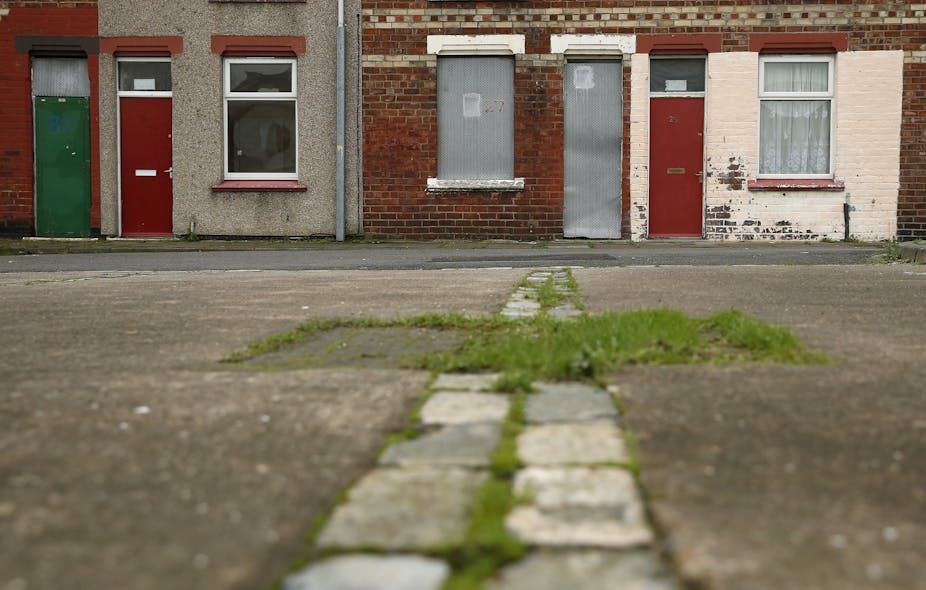Asylum seekers awaiting a decision on their claim for protection in the UK have been put at risk by a system that outsources their housing to private companies rather than local councils.
There was a national outcry in January when The Times revealed that asylum seekers in some parts of Middlesborough were living in houses with red doors, and that some had been the target of hate crime.
These crimes included threats, property damage and harassment, such as smearing dog excrement against home entrances and throwing eggs and stones at windows. The National Front logo carved into one door left little doubt about the reasons the occupants were being targeted.
The company contracted to provide the housing, G4S, had used a sub-contractor, called Jomast which denied any policy of identifying asylum housing, saying it “uses red paint across its portfolio of properties”.
Yet Suzanne Fletcher, a retired Liberal Democrat councillor, identified the problem of the red doors to G4S more than four years ago. She suggests that it may not have been the original intention of G4S to identify asylum housing, but that they did not respond to the complaints and the red doors made it easy for the asylum accommodation to be identified.
Days after this made national headlines, the Parliamentary Home Affairs Committee took evidence from those contracted by the Home Office to provide asylum housing. Stuart Monk, managing director of Jomast, claimed the housing was “a product suitable for asylum seekers”. But the Labour MP Chuka Umunna challenged housing providers such as Jomast:
You buy up cheap homes in some of the most deprived communities and you’re making money out of housing some of the most vulnerable and poor people.
The move to privatise
Housing those seeking asylum used to be managed differently. From 1999 onwards, local councils provided asylum housing under the auspices of the National Asylum Support Service, ensuring that asylum provision was a small but significant element of general welfare provision.
A 2006 renegotiation of contracts allowed private sector operators to bid for these contracts and by 2012 council provision had ceased entirely. That year, the Home Office awarded six COMPASS (Commercial and Operating Managers Procuring Asylum Support) contracts to the profit-making security companies G4S, Serco and a joint venture between Reliance and Clearsprings, none of whom had previous experience of housing people seeking asylum. Worth £620m, COMPASS was the largest contract ever awarded by the Home Office.
Concerns about the quality and security of the asylum housing have been well-documented. In a 2014 report, the National Audit Office found G4S and Serco failed to meet key performance targets “notably relating to the standards of property”.
A parliamentary inquiry into asylum support for children and young people in 2013, led by Sarah Teather MP, took evidence from a number of people seeking asylum. It highlighted in distressing detail that families are being forced to live in cramped, crowded, dirty and unsafe accommodation in areas where they are subjected to abuse.
The inquiry had little effect on housing provision for those seeking asylum. In April 2014, the Public Accounts Committee reported on asylum accommodation and COMPASS. It’s chair, the Labour MP Margaret Hodge, drew attention to “the loss of the knowledge of experienced specialist providers”, pointing to the important role previously held by local councils and the specialist knowledge necessary to deliver such contracts.
Far from provision of housing for asylum seekers improving under privatisation, this evidence suggests that things are getting much worse.
Councils stepping up
Although councils are no longer contracted to provide asylum housing, providers must obtain a licence from the local authority for any properties used as shared accommodation and must seek approval for new properties they wish to use to house asylum seekers. In Kirklees, West Yorkshire, statutory service providers monitor COMPASS to try and ensure housing providers abide by their contractual agreements. In Sheffield, asylum rights groups working with the council have stopped the practice of unrelated adults being forced to share bedrooms.
In 2015, Glasgow and Sheffield City Councils both called for a review of COMPASS contracts. These types of initiatives may influence the procurement and management of asylum housing, but there are no legal obligations for contractors to follow the advice of statutory services, such as police cohesion officers or school placement officers.
The contracted companies feel that some local authorities are taking too rigorous an approach to housing standards. Yet, with the councils’ role removed, greater vigilance is required around how those seeking asylum are housed.
The recent red doors scandal has prompted some action. Immigration minister James Brokenshire has commissioned Home Office officials to conduct an urgent audit of asylum seeker housing in the north east and Keith Vaz, chair of the Home Office Affairs Committee, suggested it would launch a full inquiry into the COMPASS contract. For those living in substandard housing, those developments cannot come quickly enough.
The decision – taken by the Labour government and continued under the coalition and the Conservatives – to outsource these contracts significantly changed the culture and reshaped the provision of housing that people seeking asylum rely upon. It is time to give detailed consideration to the way in which the state should respond to the housing needs of those seeking asylum.
By privatising housing services previously provided under councils, we have exposed people seeking asylum to the “ill-judged” decisions of some private companies. Instead, we need to reconcile housing provision with the dignity, respect and safety of people seeking asylum.

